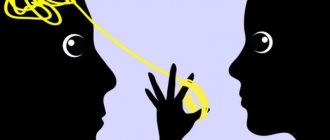- Human addiction: what is it?
- Types of emotional dependence
- What is the cause of dependent relationships?
- Test: test yourself
- Step-by-step instructions for overcoming addiction
- When should you see a psychologist?
We are often afraid of developing an addiction to drugs, alcohol, smoking, gambling, but we do not take into account that a painful dependence on another person can also greatly complicate our lives and become very dangerous for our health.
After reading this article, you will understand why dependence on a person occurs, learn to distinguish its signs, and, most importantly, understand how to get rid of such a pathology and return to a full life.
Human addiction: what is it?
Dependence (addiction) on a person is a psychological state in which a dependent individual experiences pathological attachment to the object of his love. Because of this, a person practically loses his personality and lives with the problems and joys of his partner.
Addictive behavior is caused by the inability to take responsibility for one’s feelings and actions, and the addicted person is not always able to cope with the accompanying negative emotions (sadness, doubts, resentment, anxiety, uncertainty) on his own. It takes great courage, and often the help of a competent psychologist, to find the resources to confront yourself and overcome addiction.
Don't fall for manipulation
When we meet a new guy and we really like him, we happily put on rose-colored glasses with a big sign saying “I’m in love” and don’t notice the obvious things that are being done to us. There are men who deliberately behave in such a way that we become attached. It is necessary to monitor such moments.
For example, if a guy took the initiative and was actively involved in the relationship, and then disappeared for several days without a normal explanation, then you should be wary. Especially if this happens more than once.
I have had experience of such relationships. I was a very young girl and was experiencing my first crush, so I fell for such tricks. That relationship was a difficult but rewarding experience for me, and now I judge people’s behavior very strictly.
Types of emotional dependence
Addiction can be of different types in different kinds of relationships.
- Love addiction
usually begins with a fairy-tale love story - two people are constantly inseparable, enjoying each other’s company, new sensations, while friends, girlfriends, relatives fade into the background - lovers do not need anyone. Then the feelings subside and a desire appears to diversify the isolated life with hobbies and meetings with friends. Healthy relationships easily cope with this period, but pathological ones do not. The dependent partner begins to feel that he is no longer loved, that he has been abandoned and betrayed, and the main emotions become resentment, jealousy and dissatisfaction. As a result, the initial idyll is replaced by quarrels, accusations and threats. - Friendly dependence
is reminiscent of love, with the only caveat that the characters are friends. There is the same jealousy of other people and activities, the fear of losing a friend and an urgent need to communicate with him. If a friend has a loved one or other friendships, the dependent person becomes depressed and feels betrayed. - Parental dependence
is a type of dependence that begins in early childhood due to improper upbringing. This usually occurs due to the oppressive behavior of parents who adhere to a totalitarian style of education or who themselves became victims, experienced psychological trauma, or grew up in an incomplete family. Such parents suppress any attempts by the child to become independent; they are afraid of being left alone or abandoned. Their actions have the color of manipulation - they invent non-existent diseases, promise an inheritance - in a word, they do everything so that the child needs them, simultaneously depriving him of the opportunity to develop a sense of responsibility, make his own decisions, and make an adequate assessment of his actions.
How to find time for yourself?
This is not about visiting a cosmetologist or going to the gym. Time for yourself – a few tens of minutes a day, spent completely alone.
At these moments, you can try to meditate, do breathing exercises, paint a watercolor landscape, think about the book you read. In other words, this time should be devoted to self-development and peace and harmony.
It's important to find a gap in your daily routine that you can stick to consistently.
What is the cause of dependent relationships?
If you recognize yourself, your partner or the history of your acquaintances/relatives, you will probably be interested: what is the reason for this picture, what is wrong, why did this happen?
The causes of emotional dependence are usually:
- parental dislike in childhood;
- the presence of psychotrauma suffered in childhood;
- excessive parental care;
- noticeably low self-esteem, lack of self-confidence;
- the desire to receive approval and praise from parents and others;
- disrespectful attitude of parents;
- existence in poor material conditions;
- emotional infantility;
- fear of one's own uselessness;
- fear of loneliness;
- inability to take responsibility for one's behavior;
- frequent criticism;
- the desire to be subordinate to someone;
- improper upbringing;
- an absurd idea of love, the desire to be one with the object of adoration, to be together from morning to evening;
- the presence of psychological complexes.
Don't exclude other men from your life
This recommendation sounds strange, but it will be useful for girls who tend to get attached. Because, being surrounded by other men, you will feel more confident and in the subconscious you will gain confidence that your chosen one is not the only representative of the stronger sex on the planet.
Try not to disappear from companies where there are other guys, and also choose a male trainer or doctor. Being surrounded by men does not mean betraying your partner. This is just a little trick that will benefit your self-esteem.
Test: test yourself
How do you know if you are addicted? Typically, a strong feeling of dependence on another person manifests itself in total control over her actions and movements, in the desire to constantly be near her, in the loss of self-control over her thoughts, feelings, and behavior.
Next TEST of 9 questions
will help you determine the presence and level of dependence on a person. Please answer Yes or No questions as honestly as possible.
- Do you often feel anxious when you think about your relationship?
- Do you find it difficult to refuse your partner?
- Do you desperately need your partner's approval?
- Does your self-esteem depend on such approval?
- When your partner praises you, your mood noticeably improves; do you like yourself?
- Do you feel afraid if your partner is unhappy with you?
- Do you panic if your loved one is in a bad mood?
- Can't imagine life without a loved one?
- Are your old interests no longer enjoyable?
- Do you no longer use passwords, do not have secrets from your partner and demand the same from him?
If you haven’t given a positive answer to any question, you are not dependent on your partner.
If you answered “Yes” 1-2 times, you have a mild stage of addiction that you can cope with on your own. Analyze your behavior from the outside, study information on this topic, think about how to correct the situation.
From 3 to 5 positive answers indicate that you have an average degree of addiction and you are recommended to consult a psychologist/psychotherapist to understand in which direction you should work on yourself.
More than 5 positive answers indicate a severe degree of addiction. You need to take action and seek help from a specialist.
And we will tell you about ways to correct addictive behavior.
Don't romanticize
Attachment is formed not because we spend a lot of time with our partner, and not even because he is very good and interesting. Everything happens because we think a lot about this person, keep his image in our minds and fantasize.
Try to dream less about dating, do not assign non-existent qualities to him, so as not to be fascinated by the person. Look at things more soberly. Think about whether you imagine your new chosen one as a prince on a white horse.
Step-by-step instructions for overcoming addiction
- Step 1 – AWARENESS.
Start by recognizing and accepting the fact that addiction exists. Mentally talk to yourself, say that you would like to get rid of this condition. This step is very important, the brain is accustomed to thinking that this is love, not addiction, your sincere readiness for change will force the subconscious to look for options to change the situation. - Step 2 – SOLUTION.
The next step should be a firm decision to leave the painful relationship or a decision to change your personality (thoughts and behavior) within the existing relationship. It is necessary to understand that dependent relationships are supported by both participants in the union, so if you get rid of addiction, your partner will either have to change in order to follow you into a new healthy relationship, or leave himself. - Step 3 – DEFINING BOUNDARIES.
Learn to refuse your partner and defend your position. At this stage, self-love gradually returns, you will begin to do what you like, listen to your desires. - Step 4 – FILLING THE VOID .
In a dependent relationship, your own hobbies have long faded into the background. Start getting to know yourself again. You can make a list, indicate in it what your partner gives you that you cannot give yourself, and start bringing joy to yourself. You can also listen to yourself, remember what you loved to do, what was interesting to you, resume lost friendships or family relationships, return to an old hobby or find a new one. Sports or dancing can be an effective medicine, because by improving one’s body, a person not only increases self-esteem, but also gains health and a good mood. - Step 5 – STUDY YOUR PROBLEM FROM THE INSIDE.
Addiction is a complex psychological condition, and not everyone can cope with it on their own or see their problem from the outside. In our “Psychology of Addiction” course, experienced teachers will tell you how to cope with emotional dependence, teach methods of mental correction and help you acquire a new profession as a psychologist to help not only yourself, but also other people in a similar situation. - Step 7 – NEW RELATIONSHIP.
Start building new relationships or analyze your feelings in existing relationships - how strong is your addiction still, is there any change for the better. To do this, on a scale from 1 to 100, determine how happy you are.
When should you see a psychologist?
If you doubt your abilities or none of the available methods help you change your position as a dependent person, you should contact a professional.
You need to understand that in addictive behavior you are not living your life, that emotional addiction is not only a state of mind, but also a psychological disorder caused by dislike of oneself.
Addiction destroys people's lives and makes both the addict and his partner suffer. Moreover, if you do not solve the problem with drastic changes, then addictive behavior will accompany you throughout your life, and attempts to build healthy relationships will not be successful. It is necessary to regain self-respect and self-love; this is the only way to health and a new life.
To change the situation, you will have to work long and painstakingly on yourself. An experienced psychologist will help you identify the true causes of addictive behavior and correctly correct them. Remember, if you do nothing, the situation will only get worse.
The famous Roman philosopher Marcus Tulius Cicero said wonderful words with which we would like to end today’s conversation: “Happiest of all is the one who depends only on himself and sees everyone in himself alone.” Let's believe in ourselves, friends!
Developing your coping skills
To properly end your love addiction and ensure that the problem does not return, you need to develop your coping skills. As you may have noticed, the problem can occur because the person does not have enough skills to deal with life's problems or unwanted emotions.
In other words, when people are feeling down, they look for quick painkillers to help them face the pain, and one of the most popular painkillers is love.
Now, even if you have resolved the problem, you may relapse if you do not gain enough skills to deal with the problem.
Learning to stay single
In many cases, relationship addiction occurs because the individual does not have enough emotional capacity to remain single. In other words, as soon as the “addict” finds himself alone, he feels very bad and strives for a new romance.
Now the ability to remain alone can only be achieved if you have studied the psychology of love well, and also know how to properly recover from a breakup without leaving marks in your heart.
When you learn how to recover from a relationship properly, you won't have much of a problem with loneliness until you meet the right person, and as a result, you won't have problems with love addiction.










